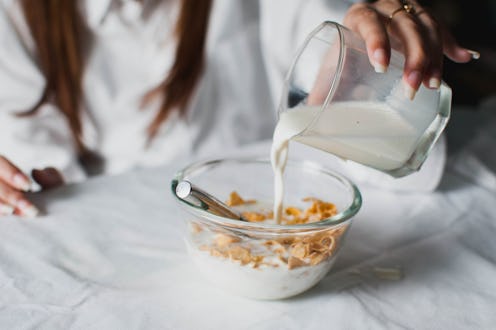Life
Supposedly Healthy Foods Some Nutritionists Avoid

When it comes to eating the healthiest foods, no one knows better than a nutritionist. With so many food trends and mislabeled products out there, it can be helpful to know what "healthy" foods a nutritionist would never eat. Sometimes it may seem like eating healthy is a straightforward process, but we all know that "low-fat" doesn't equal nutritious and that an "all-natural" frozen dinner could still be loaded with unhealthy ingredients.
"People often confuse foods as healthy because they are swayed by the big words and promises on the front of the packages instead of taking the extra time to read the truth that is listed on the back, including nutrition facts, ingredients, and certifications — or lack there of," says Tiffany Newenhouse, RD, CDN over email. "Companies want to sell product, and they pay people a lot of money to help twist the message to convince you that their food will help you in some small way."
If you're not sure if something is healthy, despite what you may have read online or heard from a friend, you can always trust the word of a health professional. Just like any food, eating these in moderation is fine, of course, and what's right for one person may not be right for someone else, but it's good to know what the experts won't touch if you're on the fence about a particular food or have heard conflicting opinions.
When it comes to "healthy" foods that really aren't that healthy, consider these 11 choices that some nutritionists avoid.
1. Turkey Bacon
Turkey bacon seems like it would be the better choice, but it is still a processed food, and brands often add extra salt to turkey versions to make up for taste. "The process behind making bacon is the same whether it's pork or turkey, and there are mixed reviews on the long term effects of nitrites that are in those processed meats," says Newenhouse over email.
2. Fruit Juices
Juice is trendy these days, but most nutritionists won't touch the drink, as many fruit-based options are high in sugar. "You're better off eating those 60 grams of sugar in the whole fruit or vegetable form," says Newenhouse. "Your body will have to do more work to break it all down, leaving you fuller longer."
3. Fat-Free Salad Dressing
Experts always warn about heavy salad dressings ruining your salads, so it might be tempting to opt for a fat-free version. However, fat is an important nutrient to keep you satiated, and when brands remove fat from their dressings, they often add in a whole load of other unhealthy ingredients such as sugar, salt, and additives.
4. Egg Beaters
Using egg beaters seems like a convenient and easy way to make some scrambled eggs in the morning, but although eggs are healthy, these beaters are deceiving. Egg beaters contain over 30 ingredients, some of which are chemicals and additives. It's much better to opt for whole eggs instead,
5. Sugar-Free Desserts
If something doesn't contain sugar, it must be good, right? Unfortunately, sugar-free doesn't mean it's free of other unhealthy ingredients as well, and oftentimes even worse sugar substitutes are added in its place. "If you choose the sugar-free version, companies will add more fat, salt and some sort of sugar substitute to make you think you're eating the real thing," says Newnhouse. "The problem is that most of these sugar alcohols can bother your stomach and make you bloated, gassy, and uncomfortable."
6. Olive Oil That's Not 100 Percent
Pure extra-virgin olive oil is filled with heart-healthy nutrients, but if you're not getting the right stuff, it could harm your health. "Imported olive oil sounds fancy, but can have canola fillers," says Jessica Swift, RD, also known as Chef Jess, over email. "Make sure your olive oil says 100 percent pure extra-virgin olive oil on it to ensure you are getting all of your heart health benefits."
7. Microwave Popcorn
Sure, popcorn is a healthy, fiber-filled snack, and sticking it in the microwave is definitely convenient, but the packaged version of popcorn comes with some unhealthy chemicals that are used to give the treat it's buttery flavor. A study from the American Journal of Pathology found that the ingredient used to mimic the butter flavor in popcorn can cause respiratory toxicity and result in nonreversible lung disease.
8. Fiber Bars
Like egg beaters, fiber bars are often loaded with unnecessary chemicals and additives. "Do you know how many ingredients there are in there? I counted 30," says Newenhouse. "Those 9 grams of fiber aren't worth the stomachache afterwards." You're better off choosing a more natural fiber-filled snack such as an apple or celery.
9. Cereal
Cereal sounds like a harmless breakfast food, but most varieties are laden with sugar and devoid of any nutrients. They are filled with meaningless health claims and can lead to a spike and crash in your blood sugar levels. Opt for versions low in sugar and high in fiber, and pay particular attention to portion size.
10. Charred Meat
"I like a good barbecue just as much as the next person, but I avoid hyper-charred meat, poultry and seafood, even if it’s one of the leaner cuts," says Edwina Clark, MS, RD, APD and Head of Nutrition and Wellness at Yummly, over email. "When meat, poultry and seafood are cooked at a high temperature, animal fat melts and smokes, and proteins undergo a variety of changes. Both of these processes result in the formation of carcinogenic hydrocarbons, which have been linked to a variety of cancers."
When in doubt, always choose whole, plant-based foods, and avoid "diet" foods, which are often deceptively misleading.
Images: Fotolia; Pixabay (11)